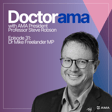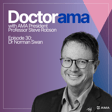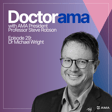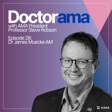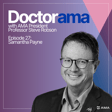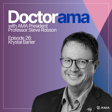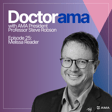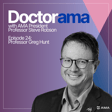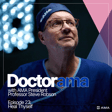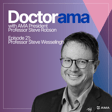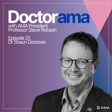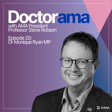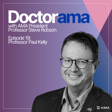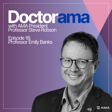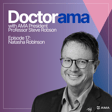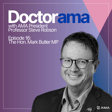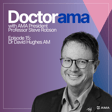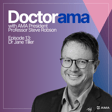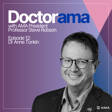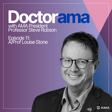Become a Creator today!Start creating today - Share your story with the world!
Start for free
00:00:00
00:00:01

Episode 13 - Professor Kelvin Kong
In episode 14 of Doctorama AMA President Professor Steve Robson chats with Professor Kelvin Kong.
Recommended
Transcript
Introduction and Welcome
00:00:00
Speaker
My guest today was NAIDOC's Person of the Year and that is one major honour. We're going to find out why this person is such a worthy recipient of that honour on Dr Rama. You're listening to Dr Rama with Steve Robson, bringing you the best of health, medicine and people.
00:00:23
Speaker
My guest today and Dr. Rama is Professor Kelvin Kong, one of Australia's most celebrated and well-known surgeons. Welcome to Dr. Rama Kelvin. Thanks for having me. It's a real pleasure. Thanks for coming along to chat with me today.
Inspiration for a Medical Career
00:00:36
Speaker
The first thing I wanted to ask you was why medicine? What was it that made you want to go into medicine? It's quite a long story, but a fun one. When I was growing up, a lot of people used to come to our house. My mother was one of 12.
00:00:53
Speaker
And she was very fortunate enough to become one of our Aboriginal nurses. And as such, she held a lot of health information. And so people would come to our house for a whole lot of array of different things, whether it be suture removal, wound dressings. We even remember taking a cast off one of our cousins at one stage there. And so my sisters and I used to race around to see what would help her the most.
00:01:16
Speaker
and would fight over who was doing the suturing or the cutting or, you know, those kinds of things with the fun stuff. And as you're a young kid, you really enjoyed that because it was a zing of activity and it was quite a hub of fun in the family house. It wasn't until you started getting to high school, you start realising that or sapping a lot of our family time and started questioning that, you know, why have my non-indigenous friends
00:01:40
Speaker
not go to their aunties or someone's house to get all their medical treatment and that they'll go to the hospital, the poly clinic or the local doctor. And you start realising in that mature reflection that there's this thing called access equity and that a lot of our community, whether it be immediate family, extended family and friends of family would come to our place because they couldn't get that access to care. And so that was one of the things that I really wanted to try and help out in. And so health was always going to be
00:02:09
Speaker
a prominent part of our life. And with my sisters and I were very lucky in forging a career into medicine. I think health or nursing was obviously the first option. And it wasn't until we actually got that drive and aspiration from people like Lewis Peach and Sandra Eads that really gave us that inspiration to do something. And I must confess that
00:02:31
Speaker
I'm somewhat of a Stephen Bradbury in that I just followed my sisters and they're the superstars of my family and I was very lucky to get the rewards of that. Well, Kelvin, I know your sister very well. She's a very prominent specialist herself. Was there a lot of rivalry between you guys in the early years? Oh, there still is a lot of fun to offer. And I'd say that because it's fun banter.
00:02:55
Speaker
You know, we still talk about that. They went to Sydney University, I went to the University of New South Wales, I was all over the library. She went into obstetrics and I went into surgery and we talked about who's the real surgeon in the family. You know, she was our first female surgeon, I was our first male surgeon. So there's all those kind of fun things, but never was it competitive in any manner, shape or form. And what's really nice is this wealth of medical information that we share.
00:03:20
Speaker
But also our patients benefit from that because there's a lot of crossover in the work that we do, but also a lot of questions that we ask each other all the time. So I really enjoy that banter and I really love that we have that colleagues with us. And importantly, it's such a small family around us, including the medical family, that it's nice to be able to bounce off each other. Yeah, absolutely. Kelvin, I get medicine. Why ear, nose and throat surgery
Choosing a Specialty - ENT Surgery
00:03:45
Speaker
in particular? What led you down that pathway?
00:03:47
Speaker
I was really fortunate that when I was in medical school, I managed to do some outreach work with a ENT surgeon by the name of Peter Carter. Now Peter's well retired now, but I remember going out to him to Brouwerina and seeing some of the amazing work that he does in the community and obviously going back to those days with my mother and helping out. There's always this burning desire to address that equity, but also that burning desire to be able to have that gift of giving back and helping others when
00:04:14
Speaker
so many times we needed help and weren't able to get that help i want to be a person so you know what this little kid's okay we'll look after him and that combined with the the technical aspect of what he did you know he's one of those surgeons that was very gifted and it was a cross mostly so not only is he doing the community public health like giving back
00:04:32
Speaker
in the operating field he was doing some incredible things with airway reconstructions and some of the high end e-resources that we had, which was really fascinating as a scientist and as a budding medical nerd, I was fascinated with this kind of work. So I think my practice has largely evolved in looking at some of those mentors that have had similar to Pedicarda that have really challenged the kind of forefront of medicine we do. And I think that's quite exciting that
00:05:00
Speaker
actually doing things in this country which is rivaled around the world and I think we're really privileged. I think sometimes our listeners forget how advanced and how much fun we do in the Australian medical world and how gifted we are in this sense and how lucky we are in this sense that you don't need this infrastructure of going overseas to see some of the cutting-edge technology that we have but also some of the people behind and I think I'm really
00:05:25
Speaker
happy and privileged to be part of that as well and I think that's what's exciting that makes my day excited to be able to give back at the same time as do some incredible amazing things is pretty mind-blowing for me. Yeah Kelvin
Coping with Medical Stress
00:05:38
Speaker
I've followed obviously a lot of your posts on social media over the years and the thing that I've always enjoyed is humour and I've
00:05:47
Speaker
Senior posts some really amusing anecdotes and things from your outreach work. Do you think having that sense of humour in what really is a very difficult thing helps you and helps your patients? Absolutely. There's this lovely thing called perspective, which I think my mum's always taught me. And I think in the medical world, we often forget how privileged and how lucky we are.
00:06:08
Speaker
And sometimes when you think about some of the things that we as surgeons and medicals complain about in the bigger picture of things, we are so lucky. And I think sometimes that is where the humor reflects on, because when you're growing up and not thinking about the harder things, that makes you have a laugh, but also gives you that humility back to realize that we are actually lucky. So, you know, good example, during COVID times, the amount of my colleagues that were really up
00:06:36
Speaker
upset and distraught about not being able to go to their nice restaurant that they go to on a regular basis. And, you know, it made me smile to think about, well, when you're growing up, you're lucky to get food on the table. About going to the pharmacy and how that's a right of us, a human right to be able to get our medications and that they're locking us down for not getting those medications when, you know what, since COVID's finished, a lot of the community I look after still cannot do that for affordability, for access.
00:07:02
Speaker
for prescribing for a whole lot of issues around there and so some of those things I think for us at the time can be quite harsh but in reality the privilege that we have is very beautiful and I say it's a wonderful thing because we're very lucky in that sense and I think sometimes it's nice to point some of those finer things out
00:07:20
Speaker
in a comical sense, because by no means am I saying I'm trying to be a martyr in this aspect, but just really point out that, you know what, we're pretty lucky. Let's get some perspective on this and let's help out those who are not so fortunate as we are.
Chronic Ear Disease in Indigenous Children
00:07:33
Speaker
Kelvin, one of the things I guess a lot of listeners will be really interested in is why young Indigenous kids are so prone to chronic ear disease. What is it that makes it such a big
00:07:46
Speaker
I think there's several fold and when I started researching this area, I was one of those things that made me was quite perplexed as to why it's happening. Every kid in Australia experiences a disease at some point in their life. And I think the biggest difference is getting that access early, but also at knowledge base to know how to manage this in appropriate manner, which gets us on the right pathway. I think what we see is we're seeing
00:08:12
Speaker
a reflection of the equity and also the social determinants of health. I think that's a term that we've been around as to looking at poverty of our disease process. But in reality, that's what happens. So if you get it is as you look after it and you don't get treatment for it, the fluid builds up, the chronicity builds up, the complications build up. The hearing becomes worse. The interaction becomes worse. The education gets worse.
00:08:39
Speaker
And where those social effects happen is that ultimately, at a young kid's age, you're getting more falling behind in school, you're getting a poorer education, you're getting poorer education outcomes, and ultimately, you're getting poorer access to employment opportunities. And at the other end of the spectrum, I say this time and time again,
00:08:57
Speaker
where you're seeing the incarceration rates of our population as absolutely astronomical. And that doesn't mean that we're a more villain portion of our society, but rather a reflection of what we're doing in terms of being punitive rather than rehabilitative. And I think for us in particular the hearing world and seeing so many of those people have hearing deficits actually makes me ponder about how we can actually get.
00:09:21
Speaker
fix and get sorry reflect on that and get into them earlier so we can actually fix those problems. So when we look at the causation of these issues a lot of it comes back down to pure things about being able to see a GP, being able to see a local doctor, being able to get some local medicines, being able to get the interaction with
00:09:38
Speaker
simple promise surgery. Most things I find are very simple things and it's reflected in some of the programs that we're doing where we're pushing harder to get indigenous health practitioners and audiologists to lead some of these conversations as well as lead some of these clinics. And those simple solutions are often the best when we look at this complex where we live. Particularly medically, we want the fanciest gadget, we want the latest toy to play with. In actual fact, if you get back the basics, you can actually do a whole lot of wonderful work in this space.
00:10:05
Speaker
Look, it's really interesting, and we've discussed this before, the fact that untreated hearing loss in kids can cause an incredible disruption, you just said before, through education, employability, and rates of incarceration. I think we've discussed before that if you have untreated hearing loss and you are an Indigenous, you have a really high chance of ending up before the judicial system. Is that still the case?
00:10:34
Speaker
Yeah, and I think if I look at it in a different aspect, it's that difference in what you hear and see, and that's the crux of it.
00:10:49
Speaker
Yeah, absolutely. That's a deliberate pause and in terms of actually being able to hear. I got you, I'm here now. The biggest issue that we see in these aspects is being able to hear. And one of the simple things we take for granted is this amazing thing on hearing. If I take it from a different perspective, let's talk and pretend that we're both amazing musicians and we'll go into the opera house for a concert.
00:11:13
Speaker
And suddenly you walked into that opera house and you could hear nothing because I put plugs in your ears and you're going to go enjoy this concert with some plugs in your ears and earmuffs on. Let's go in there and afterwards I want to ask you lots of questions about which part of it you like, which instrument you like the best and see what happens when you come out.
00:11:31
Speaker
That's one example as an adult as a child, you know, the grandparents or parents out there or listening, we've got young kids at home who sing and play with them and enjoy that laugh, that smile on their face. If you've got a kid in front of you can't hear, so they look at you like you're someone who's just miming something to them.
00:11:48
Speaker
they're not enjoying that. And as our culture is so oral and interactive, it's so important to be able to get those simple things right because those simple things lead to that enjoyment in life. So if you're not learning, if you're not interacting, then you're going to get very disinterested very quickly. And so often these kids in primary school and high school are often kids who are just lost and disinterested because they're not hearing that well or natural fact
00:12:11
Speaker
They're being punished or put in the back of the classroom and they should be moved out the front of the classroom or sorted out. Now I'll say this time and time again with my non-indigenous patients because they'll call up their friend who will say, I know Kelvin, they'll get a hold of me, we'll get them sorted out, they'll come back.
00:12:26
Speaker
And when you fix their ears, they come back a month later and go, thank you, I've got a different kid. The class has interacted, the teachers have begun, and they're eternally grateful and it's a beautiful thing to be a part of. Yet there is a segment of society that doesn't have that access to the health care that we need for those simple solutions to actually get those things addressed so that we can actually get them back to that normal curve. And then I always say this as well, that even if you hate
00:12:49
Speaker
Aboriginal health, even if you think this is a waste of time, as a taxpayer, you should be absolutely pushing as far as you can because every dollar invested early on in any child's life is about $25 saved when they're a teenager. So we need to invest very heavily in this now so that we make Australia a bigger and beautiful and more smart country than we already are. That's a really fantastic statistic about the economic payoff. I think we should all bear that in mind exactly as you said.
Integrating Indigenous Knowledge in Healthcare
00:13:18
Speaker
About 10 years ago, I'm not sure if you remember, but when I was with the College of RNG, I had you come and give a talk to the College Council and you gave a talk that I can remember vividly 10 years later to this day. It really had an effect on me. You showed a photo of where Burke and Wills had succumbed.
00:13:39
Speaker
And it looked like a fairly inhospitable place, but toward the end of the talk, you said, actually, they succumbed in the middle of plenty. You know, these plants are edible. If they'd dug for water here, they would have been able to find water and they just didn't seek help from the indigenous people in the area.
00:13:58
Speaker
Do you think that's still an ongoing issue for people here, that we're not kind of sharing our culture and learning from it? Absolutely. I plan that so much because there's so many lessons in that. And there's a contemporary lesson as well as a traditional lesson on that. From a social perspective, it is really important to listen to our elders and listen to the local Aboriginal people. So we understand our economy, we understand our people, we understand our medicines, we understand our lifestyle.
00:14:28
Speaker
That goes without saying, when you understand those things, our patient interaction, our patient rapport is better so we can get better health outcomes. And of those, some of the traditional medicines are still, I think, untapped in some of the resources we have. From a contemporary point of view, I think it's really important to understand that the way in which we do health can sometimes be dictated by someone who feels like they know better.
00:14:51
Speaker
And we forget about this thing called co-design, which is a buzzword used, but actually understanding it in a true sense of the meaning is actually stopping and listening. As my nan said, we have two ears and one mouth, so we need to listen twice as hard as what we talk and just listen to some of these solutions. So when we have community solutions about Aboriginal health care, then we should listen to that. And a really good one example of that is the COVID response we had.
00:15:15
Speaker
The COVID response in our Indigenous community compared to that around the world was incredible. And I think one of the strong reasons behind that is because it was actually led by an Indigenous caucus that actually took charge of it and said, this is how we're going to protect our communities. And it was a fantastic response. I think something we should be celebrating. And that's a really good example of how we can do some of these Indigenous health solutions, because the solutions aren't necessarily the way in which we think of traditional medicine. So some of my clinics are done in Aboriginal medical services because
00:15:43
Speaker
having at the hospital is just not culturally safe for them. Some of the clinics I have are run by Indigenous Health practitioners because it's not safe for me to be running some of those clinics. And me as a warrior, my man can actually pay homage to that and rather than be afraid of that, actually embrace it and say, you know what, that's okay, I'm happy to take that second state. So I was looking at certain things in different nuances and making the most of them. And also when we get our hold of our funding and structures is how to actually build our structures appropriately so that we can maximise that funding rather than saying,
00:16:12
Speaker
Well, this is the cut I deserve. Let me just run with this and do as many as I can do from that point of view. So some of those aspects I think we need to talk about more and not be afraid of talking about, because I think some of the creative solutions that people are doing around Australia are amazing. Yeah, look, I agree with you. And I think that listening.
00:16:29
Speaker
and appreciating is just so important. And I say, if you don't know, then let's find out together and listen. Kevin, what advice would you give to young Aboriginal Australians who were thinking about a career in health and in medicine in particular? What would your advice to them be?
00:16:48
Speaker
Keep smiling is probably the number one. I always tell my kids, be kind and be useful. I think the important thing is dream the dream you want to dream. And when you dream that dream, then finding the people around you to break down that dream into reality.
Advice for Young Aboriginal Health Aspirants
00:17:04
Speaker
Because if you were to tell me when I was in high school that I'd be a, you know, as a throat surgeon talking to you, I would have laughed at you and said, that's not possible at all. But knowing that, you know, if you want to go into medicine, you got to do these subjects and get these subjects right.
00:17:17
Speaker
When you get to that barrier, you get to the next stage of making the application. When you do the application, you need to practice for this interview and these kind of things. Same with when you're getting on the surgery or physician training or any part of medicine you go into. If you break down all those things and just chip away at them, they're very, very achievable.
00:17:33
Speaker
I think sometimes when you're young and look at the big world you think it's not possible. The fact that I'm here, the fact that there are many people around us doing incredible things all comes down to the support around you and I probably homage to the people around me because it took a whole community to actually bring me to where I am today and I don't fall short of paying my respect to those people but also for those who are unsure, find out the right information so you can actually make the right move to get you in the right place you need to be.
00:18:03
Speaker
Excellent. And also parents, I mean.
00:18:07
Speaker
If there are parents of Indigenous Aboriginal and Torres Strait Islander kids in Australia who want their kids to go into medicine, have you got any particular tips for their parents? Oh, I believe. I think half the problem that we have with parents is not believing in that. And this is for, here's a really weird concept that I'm processing more recently, is that I get asked for advice for all people coming through. And so when I go through medicine, you know, the kind of people we're talking about here, we're talking about
00:18:35
Speaker
an upper echelon of society that we don't necessarily have had a lot of contact with in the past. And so kids are asking me for their advice. And I think what's weird about that in looking back is that the advice they're getting is advice that I give every kid. It doesn't matter who you are. And that is have belief in yourself.
00:18:53
Speaker
have belief around you and get the resources around you. I think where we've been poorer in the past in being able to maximise that is that we haven't had the resources or the belief around us, just the dreams. I think what we're slowly doing is breaking down those resources so that if you are a kid, no matter who you are, Aboriginal, refugee, low SES, up and north shore Sydney, that if you get to the right person and you can actually get the right advice to break those steps down, you'll achieve all the achievement you want to.
00:19:21
Speaker
and be able to live all those dreams that you do want to achieve. I think that's really exciting. That's the beautiful thing about Australian society is that everyone born in this country should have that equal opportunity and access to be whatever they want to be. And certainly me as a simple dad and a war on my man, I'm here to help as many people, as many Australians achieve their dreams as they want to.
Scholarships and Their Significance
00:19:43
Speaker
I've lived a beautiful life, I've got a beautiful family around me, and anyone who can achieve simple things like that of smiling and being part of your family deserves every kind of benefit and every kind of recognition I can get from that. Yeah, look, thank you very much. And to your point of supporting people, moving forward with their careers,
00:20:02
Speaker
The AMA obviously does our best to provide scholarships to Aboriginal and Torres Strait Islander kids who are doing a medical degree, and I'd encourage any listeners here who are thinking about donating to those scholarships. That'd be great. Kelvin, do you think those scholarships help?
00:20:20
Speaker
people who are wanting to become doctors? I think there are several aspects to that question. The number one thing which I think is at most important, which people don't probably pay particular attention to, is that the AMA, by offering this scholarship, is showing where their true values are. And that is so important for our society to realise that as the leading health organisation in this country,
00:20:41
Speaker
we're saying that Aboriginal health is very important and we believe in our young ones and I think that in itself is just incredible and so powerful and so powerful that it helps us drive that and certainly I was a very lucky recipient of this in the early years of that and made a big difference for me and it wouldn't have mattered whether it was five dollars in terms of value of it. The fact that the AMA recognises that I deserve to be here and that I have a future in this space and that I have colleagues that believe in me is just an absolutely beautiful thing.
00:21:09
Speaker
The second part then obviously is to make sure that our applicants believe that they can do this and that application process and also that competitive process for them is really reassuring that they're justifying to themselves that they're not just here to make numbers up. They actually are really important and that they will make a huge contribution from that point of view.
00:21:28
Speaker
to the funders to fund this kind of thing believing that again is just so so important for us so I strongly support this it's been a wonderful addition and a big help for me in my career and I'm sure that those who have received this are similar from that point of view but also the message it sends out to all the organisations that try and challenge and do better than each other in this space is really important for us too so
00:21:49
Speaker
I acknowledge and compliment the AMA for this wonderful scholarship and I support it wholeheartedly.
Conclusion and Reflections
00:21:55
Speaker
Kelvin, it's always a pleasure talking to you and I'm really hoping we can catch up and have a yarn again.
00:22:00
Speaker
Soon, the funniest thing I think you have said today is that you're a simple man, because clearly you are a man of extraordinary achievement and leadership. And I think people look to you and say, this is how I want to be. And I think that's the greatest compliment of all. I'm sure there are so many people saying, I would really like to be like Professor Kong.
00:22:22
Speaker
Mate, I want to thank you again. It's always great fun speaking with you. Thanks for giving up your time. Today, I know you're so busy. Thank you so much for your interest and thanks for your time as well. You do incredible work and thank you to AMA. All the best. Thanks for talking to me today on Dr Rama.
00:22:46
Speaker
You've been listening to Dr Rama, a podcast produced on Ngunnawal country by the Australian Medical Association. All rights reserved.
